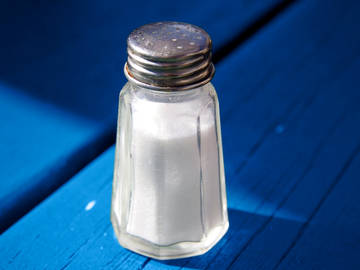The word salty has in recent years been appearing more and more frequently outside of its culinary applications.
https://twitter.com/MeanestTA/status/1509936434106580993?s=20&t=JoX3KQ1Wt5-37BWJOw8Ldw
Such use often includes a nod to the word's culinary applications.
https://twitter.com/FoodNetworkCA/status/826433124963872768
Salty took a circuitous route to get to where it is today. It first appeared in the 1440 Latin-English dictionary Promptorium Parvulorum as a translation of the Latin salsus, which means both "salty" (tasting of salt) and "salted" (covered or preserved in salt). Salty referred initially to taste:
The Buckes or Hartes horne, whose leaues be sweete in tast, & somwhat saltie,...
— Thomas Hill, The Gardener's Labyrinth, 1577
as well as to things that contained salt:
if so the Onyons be put into hot water, or (as Plinie willeth) into saltie and warme water,...
— Thomas Hill, The Gardener's Labyrinth, 1577

By the late 1800s, 'salty' referred to various aspects of naval life and culture. Since sailors had a reputation for colorful language, 'salty' soon came to refer to crude speech—and, later, to explosive anger.
This "containing salt" sense was often used of water, but it took several hundred more years for salty to be applied to things having to do with that most common body of saltwater: the ocean. Salty sea appeared as a fixed phrase in the 1800s, and by the late 1800s, salty referred to various aspects of naval life and culture:
"What are you going to do?" she asked.
"Clear that raffle," I answered, pointing to the tangled wreckage overside.
Ah, the decisiveness, the very sound of the words, was good in my ears. "Clear that raffle!" Imagine so salty a phrase on the lips of the Humphrey Van Weyden of a few months gone!
— Jack London, The Sea-Wolf, 1904
As London's quote hints, one notable aspect of naval culture that captivated people was, of course, their language. Sailors had a reputation for being colorful characters with colorful (that is, expletive-laden) speech, and soon salty came to refer to racy or crude language:
RED HOT CIRCULAR OUT IN BRUNSWICK
Sea Captain Denounces a Physician in Printed Handbills.
SALTY LANGUAGE IS USED
— headline, Atlanta Constitution, 20 Apr. 1879
Sailors influenced several other senses of salty, including one that appeared as part of African American swing and hepcat culture. Thanks to sailors' propensity to spout off profanely and suddenly, salty came to refer explosive anger. Our earliest examples of it are in the phrase jumping salty, meaning "to get angry easily," appearing in the gossip columns of black newspapers:
WE'D LIKE TO KNOW: Why ... Phil Marshall "jumps salty" on Jamaica fellows....
— New York Age, 12 Dec. 1936
Jumping Salty was even the name of a 1936 song by Ricky Simpson.
It continued in primarily African American use through the 20th century:
"I don't know why, but he's changed an awful lot lately—come jumping salty with me when I was back here. Next time he buzzes into me, I'm going to try his head. He's a big skipper all right—but he aint [sic] too big to fall."
— William H. Jones, The Triangle's End, 1954
The jump has dropped away, but the "angry" salty remains. Grrr.




